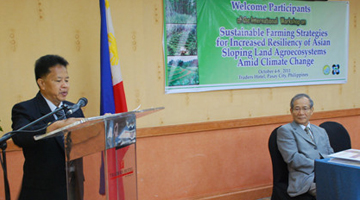 “The world takes climate change seriously.”
“The world takes climate change seriously.”
This is what Philippine Council for Agriculture, Aquatic and Natural Resources Research and Development (PCAARRD) Executive Director Patricio S. Faylon assured the participants of the International Workshop on Sustainable Farming Strategies for Increased Resiliency of Asian Sloping Land Agroecosystems amid Climate Change.
Sponsored by the Food and Fertilizer Technology Center (FFTC), the workshop addressed the threats of climate change and identified sustainable farming technologies and strategies that will help build resilience of the sloping land agro ecosystems to climate change. The workshop was held on October 5 at the Traders Hotel in Pasay City.
Resource persons and experts for the workshop were from Taiwan, Malaysia, Vietnam, Thailand, Japan, and Australia. The participants, mostly from the Philippines, and the foreign experts exchanged learnings and experiences and brainstormed on the applications of the strategies suitable to different Asian countries.
During the workshop, Faylon highlighted the potential effects of climate change on the slopelands in Asian countries. These slopelands are noted for their vulnerability to land degradation due to intensive logging and unsustainable agricultural practices, among others.
With these problems, the Faylon stressed the importance of developing, applying, and extending appropriate and sustainable strategies to land users to increase resilience of the sloping land agroecosystems to adverse effects of climate change.
Aside from effective technologies and systems, Faylon underscored the important role of policy makers in decision making and planning these strategies as in the case of the S&T (science and technology) Agenda (STA) 2011─2016 of PCAARRD.
The STA presents a clear vision and approach to ensure sustainable food security amid climate change. It aims to address such issues through assessment of the vulnerabilities and impact of climate change, and rehabilitation and ecological restoration of degraded landscapes and agroecosystems altered due to flood, landslides, and other natural calamities.
Faylon recognized the immensity of these challenges on sloping lands brought by climate change. Further, he commended the strong cooperation among international agencies such as the Australian Centre for International Agricultural Research and FFTC in dealing with the negative effects of climate change.
